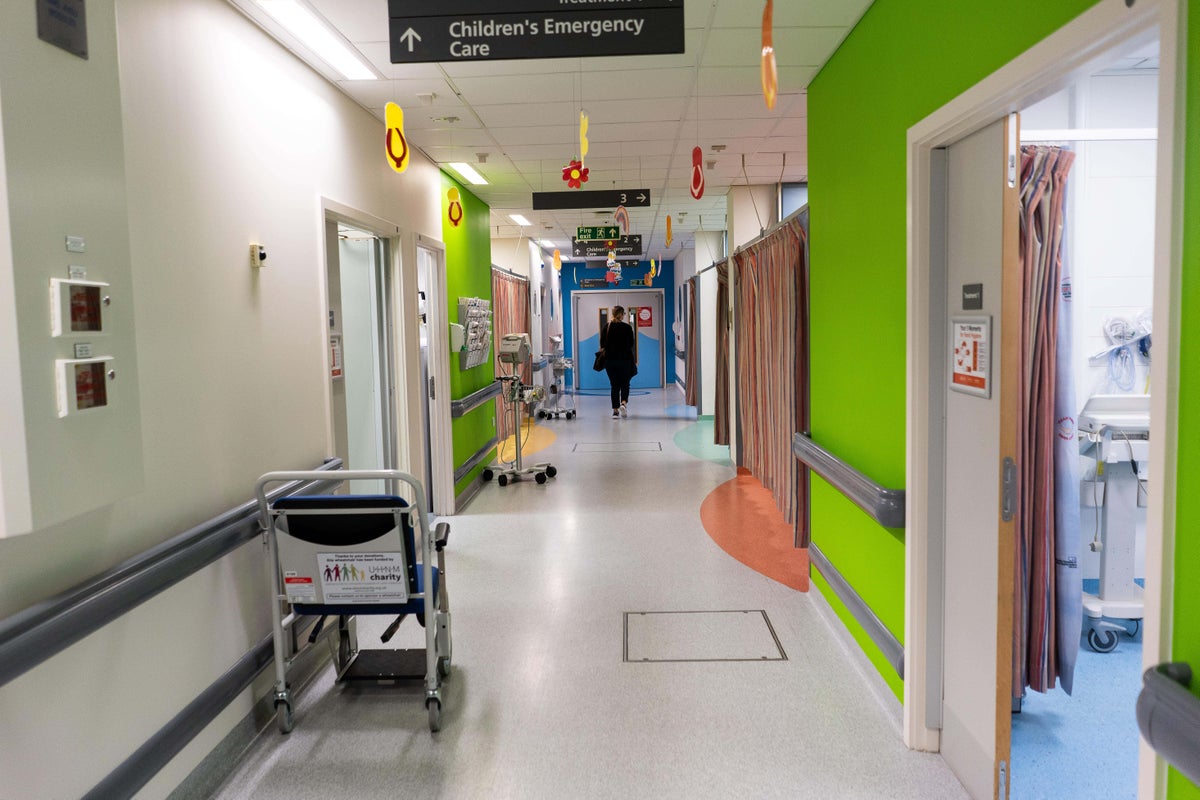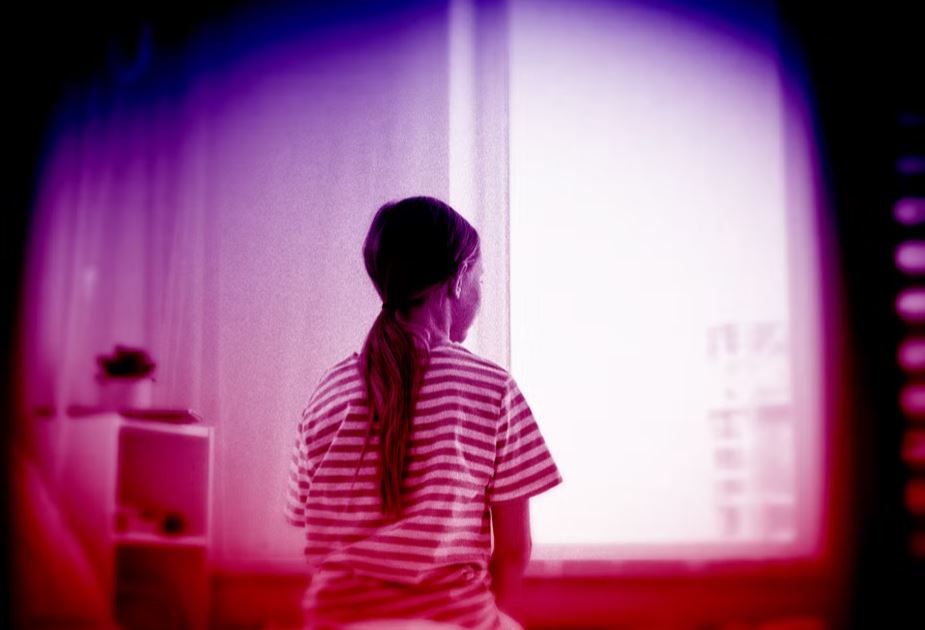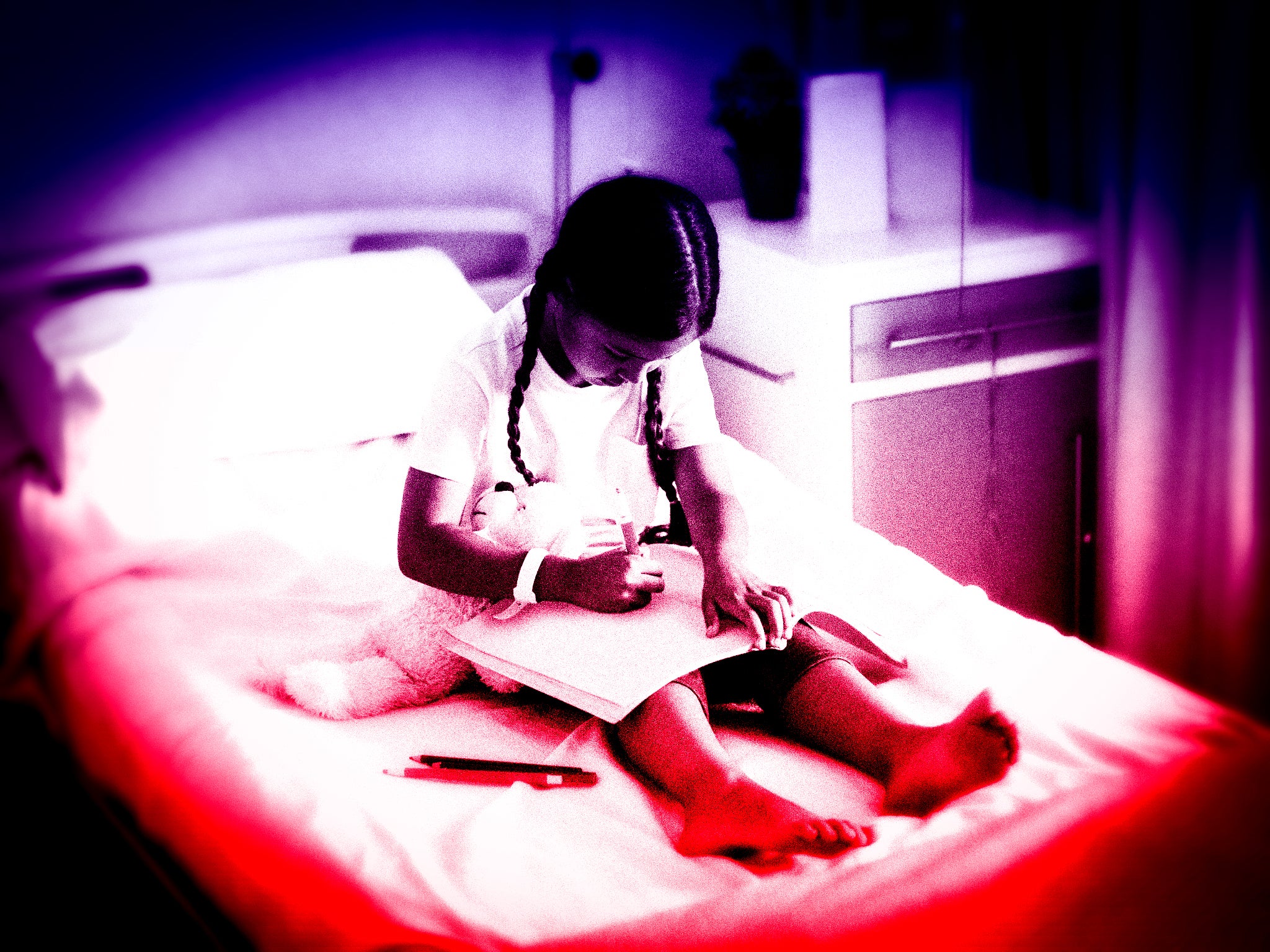
Thousands of children in mental health crisis are being treated on inappropriate general wards – with some forced to stay for more than a year and staff not properly trained to care for them, shocking new data reveals.
New figures uncovered by The Independent show at least 2,838 children needing mental health care were admitted to non-psychiatric hospitals last year as the NHS battled with a lack of specialist staff and a surge in patients.
Children with eating disorders – who often need to be restrained to be fed through tubes – are among those being routinely put on general wards. It means staff without any specialist training, including security guards, are sometimes left to restrain these young patients.
One trust chief nurse told The Independent that porters had to be trained to restrain children on paediatric wards, causing trauma for both patients and staff.
One woman, Elizabeth Grady, told The Independent her teenage daughter, who had an eating disorder, was forced to stay in a general paediatric ward for 14 weeks and was restrained by security guards daily while waiting for a mental health bed.
It comes as data obtained by The Independent shows:
- 70,000 children attended A&E with a mental health need in 2022, with 4,825 of these waiting more than 12 hours to be seen – almost double the number who waited that long in 2021
- The number of children with eating disorders being treated on paediatric wards has more than doubled in three years, rising from 473 in 2019 to 1,029 in 2022
- A mentally ill patient spent 260 days on a general ward in 2022, while another child stayed for 386 days at another hospital from 2021
Dr Camilla Kingdon, president of the Royal College of Paediatrics and Child Health, said she was “deeply concerned” about the situation.
“We now find ourselves in a situation where children and young people who have an eating disorder or mental ill health, and who may be on long waiting lists for treatment, are increasingly ending up in emergency settings and then being treated on general paediatric wards. This simply isn’t good enough,” she said.
“We need to get a handle on this situation, or it will be our children who pay the biggest price. It’s time to put children, who are so often forgotten about in health policy, back on the political agenda.”
‘Traumatic restraints’
Currently, there is no requirement from the NHS for health trusts to record the restraint of children on paediatric wards. Writing for The Independent, Labour MP Olivia Blake said it was a “scandal waiting to happen”.
She writes: “I have heard harrowing stories of staff having to close entire wards to other patients because of the use of restraint. In other cases, security guards have been brought in to restrain patients. One organisation told me that they had started to provide mental health support to medical staff carrying out restraint under these circumstances.”

One NHS chief nurse told The Independent the “biggest” paediatrics challenge at his trust was dealing with the number of children with eating disorders, with there being three times the level than before the pandemic being admitted to their wards.
“Most paediatric hospitals will have one or two spaces [for these children], but they will not have the capacity for the current crisis in children’s mental health,” he said.
The NHS chief also said that trusts had been forced to use porters to restrain children in recent months as the need grew.
He said: “They are invariably burly, middle-aged men. Almost all of these children will have some trauma in their life before and then having to be held down by these men that aren’t in a clinical role is traumatic, really traumatic.
“The staff themselves are also really traumatised and have to have debriefs, sometimes with our psychologist.”
Freedom of information responses from 54 hospital trusts across England – more than one-third of all trusts – showed there were 2,838 admissions of a child with a mental health condition to physical health wards in 2022. This is slightly down compared to 2021 when admissions rose to 3,461 across these trusts.
The average number of days spent by a mental health patient on these wards was 12 days.
‘Like something out of a horror movie’
Ms Grady’s autistic teenage daughter fell into a mental health crisis in 2021 and was forced to spend 14 weeks in a general paediatric ward in Essex while waiting for a child and adolescent mental health bed.
Ms Grady described it as a “horrific” experience that was like “something out of a horror movie”.
She said: “She was restrained for hours on end by [six] hospital security guards … there would also be up to six members of staff in the room holding her down while [a nasogastric feeding] tube was passed down into her stomach, and then the tube had to be removed every time.
“All of the hospital consultants were not trained in mental health, as they told me. The room was totally unsuitable. You’ve obviously got a lot of very small children wandering about outside the whole time and there’s no treatment, there are no nurses on the ward who are obviously trained in mental health. It’s very dangerous.”

She said the community eating disorder team would only be able to visit a couple of times a week and occasionally there would be agency mental health nurses. But these would primarily be there to restrain her daughter, she said.
Eventually, Ms Grady’s daughter became so ill on the ward she developed psychosis.
“It’s left her and me with PTSD, which we’re now trying to deal with. It’s not just us, the nurses on the ward also suffered terribly because they weren’t given any support.”
It was not until her daughter was transferred to an inpatient unit that doesn’t practice restraint, and whose staff are trained in supporting those with autism, that she was discharged and able to self-regulate.
‘Totally overwhelmed’
The number of children needing mental health care has sky-rocketed following the pandemic with one in six of those aged six to 16 estimated to have a mental health condition – up from one in nine in 2017, according to NHS Digital.
Doctors and NHS chiefs told The Independent general hospitals are still not equipped to manage children’s mental health needs.
Research published this year in the British Journal of Psychiatry found that in 2019– only 26 per cent of acute general hospitals had a paediatric mental health service.
Of these, only one hospital met the target to have 11 full-time mental health staff, and just 19 per cent of hospitals had access to these services 24/7.
Dr Virginia Davies, former chair of the child liaison psychiatry faculty at the Royal College of Psychiatrists, said the number of children in crisis presenting to A&Es has “increased exponentially over time”.
Some of this was related to difficulties gaining access to community child mental health services (CAMHS), but some was because early intervention services were cut, she said.
Dr Davies said the “vast majority” of staff in general hospitals were physical healthcare practitioners and that there are very few in-house mental health staff.
“This means that many paediatric settings will have large amounts of mental health need on their wards or in their clinics, but not have staff equipped to deal with this. We’ve got absolutely no child mental health expertise in many hospitals,” she said.
“We’ve got local CAMHS services totally overwhelmed, unable to see the ordinary community referrals because they haven’t got enough staff – so they can’t possibly come in and help out [in the hospital] as well as doing their other work.
“We have this bizarre, old-fashioned view of physical healthcare, that what a hospital needs is just doctors, nurses and other staff who’ve only been trained in physical health.”
An NHS spokesperson said: “The most recent figures show that the NHS is now treating more young people than ever before and the mental health workforce continues to grow in line with this demand – more than 2,000 trained mental health practitioners have been introduced into schools for additional and earlier support so as ever, do come forward if you need help.”
A spokesperson for the Department for Health and Social Care said it had invested £2.5bn a year into mental health services, which would mean 345,000 more children will be able to access support by 2024.
For anyone struggling with the issues raised in this article, eating disorder charity Beat’s helpline is available 365 days a year on 0808 801 0677.
For any children struggling with mental health illness or families with a loved one experiencing this, visit charity YoungMind’s website for guidance.
For anyone experiencing a mental health crisis Samaritans can be reached on 116123.







